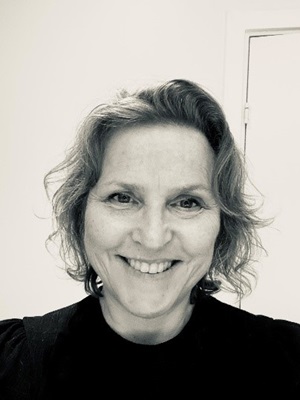
THEME: TAL2022 - Interview with Signe Hannibal Jensen
Signe Hannibal Jensen unfolds in an interview her presentation at TAL2022 with the title “Teaching and learning experiences from cross-cultural online exchange”.
Signe teaches a range of English courses on several different programmes. She has a PhD in language acquisition, so it is actually language learning that she works with the most, but she teaches on all the English-related courses at the institute, e.g. linguistics and negotiation, so the range is wide.
Signe tells about the background to her project where she had for some time been toying with the idea of doing something with students in an authentic setting and creating a setup where students had to communicate in an intercultural context about something very concrete. At a conference, she spoke to an American colleague, and it developed from there. Through a long series of meetings (challenged by the time difference), they were able to develop the project, where Danish and American students from New York University had to collaborate on making a research application. The project was also part of Signe’s development project in connection with the Lecturer Training Programme at SDU.
In the cases where the groups worked, the project changed a lot for the Danish students. These students were, as Signe intended, challenged to converse in an authentic context. One of the big gains was a greater belief in one's own competence in communication with other English speakers - both native and non-native speakers. Also, the realisation that not everyone in the American cohort of students was a native English speaker meant that some suddenly had a new view of their own competences in terms of the yardstick that you always use, consciously or unconsciously, when learning to communicate in a foreign language . The project gave many students more courage and faith in their own competences.
The Danish students also quickly recognized that they are really good at group work compared to the American students. The starting point for us is that you work together on the task and are in the "same room", where the tendency to divide the work was more pronounced among the Americans than we see here at SDU. Many groups met with their American fellow students 4 times and in addition they communicated digitally by email etc.
The actual production of the research paper that the students worked on and the theories underlying the academic framework (subject content) were naturally included in the learning objectives. Briefly, the purpose of the course fell within the academically relevant content, methods, collaboration (across national borders, time differences and cultures) and dissemination through a pitch.
The Americans were graded for professionalism, product, and effort in this collaboration. The Danish students were informed that one of the exam questions would deal with this project. The difference in the form of assessment presented some challenges for some groups, who also indicated this in the evaluations of the project. However, most groups functioned well, and the Danish students were very willing and committed. Signe expects several students to have created networks through this project.
Although there have been many challenges along the way, it is clear that Signe wants to continue and in the future Signe would like to implement similar projects.
However, she has three pieces of good advice for colleagues who are thinking of doing something in the same style:
- Find an international business partner where the time difference is not so significant.
- Involve students in the planning so that it is planned on the students' terms.
- Formalise the agreement in a process protocol so that you have mutually coordinated it. This is also necessary even if the two teachers know each other well.
A German university could be a future partner for Signe and it would still be authentic to do the project between two universities where "lingua franca" applies – a common foreign language for the participating parties. Such contact will quickly be established via SDU international.
Signe thinks it was great to present the project at the TAL2022 conference, as it is good to discuss the possibilities for international education with colleagues. You will be able to collaborate with students in other countries on all subjects, from law to biology.
If colleagues want to do international projects and hear more about Signe's experiences, you are very welcome to contact her.
Find Signe's abstract with the title “Teaching and learning experiences from cross-cultural online exchange” at page 42 in TAL2022's Book of Abstracts .
Signe Hannibal Jensen

Assistant Professor, The Department of Language, Culture, History and Communication.